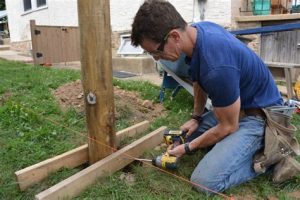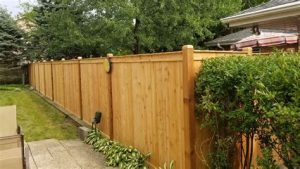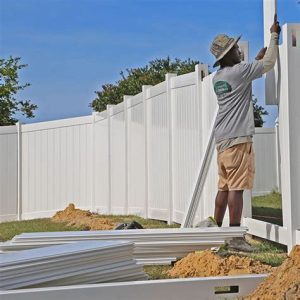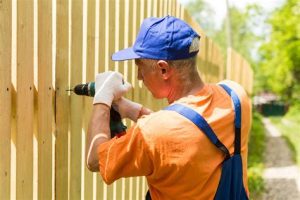Discover the impact of rain on fence installation, challenges, precautions, and benefits of professional help for a successful project even in wet weather.When the skies open up and rain starts to pour, many homeowners wonder if it’s still possible to install a fence. While the thought of muddy soil and inclement weather might deter some, there are expert insights that suggest that with the right approach, installing a fence during rainy conditions can be both feasible and efficient. In this blog post, we will explore the impact of rain on the installation process, the challenges that can arise, and the precautions you can take to ensure a successful outcome. Additionally, we’ll discuss the tools and materials best suited for wet weather installation and highlight the benefits of hiring professionals who are well-versed in tackling projects even in the rain. So, if you’re considering a fencing project and the forecast isn’t ideal, read on to make an informed decision!
Impact of Rain on Fence Installation
Installing a fence can be a tedious process, and the presence of rain can significantly affect various factors involved. It’s important to consider the impact of rain on fence installation as it can lead to unexpected challenges and complications. While rain isn’t an outright deterrent to installing a fence, the unique circumstances that come with wet weather can alter the pace and quality of the installation.
One primary concern during rainy installations is the softening of the soil. When the ground becomes saturated, it may lead to instability in the fence posts once they are installed. This can cause the posts to shift or settle unevenly, potentially compromising the integrity and longevity of the fence. Another issue is that moisture can slow down the curing process of concrete used in fence installation, leading to a longer wait time before the fence is fully secure.
Moreover, rain can lead to additional safety risks. Wet surfaces may be slippery, increasing the chance of accidents, and certain tools and materials can become less effective when wet. It is crucial to be cautious and mindful of these aspects to ensure that the installation process, despite the rain, proceeds smoothly and safely.
| Potential Impact | Description |
|---|---|
| Soil Softening | Wet soil can cause fence posts to shift post-installation. |
| Curing Delays | Moisture can slow down concrete setting time and quality. |
| Safety Risks | Rain makes s |
Challenges of Installing a Fence in Rain
Installing a fence during inclement weather can be a daunting task, particularly when it rains. The challenges of installing a fence in rain can be numerous and varied. From the slippery ground conditions to the effects of saturated soil on the foundation of the fence, these factors can complicate the installation process significantly.
One major challenge is that the wet ground can lead to unstable footing for the installer, increasing the risk of accidents and injuries. Additionally, the tools and equipment used may become difficult to manage when wet, leading to inefficiencies and potential damage. Furthermore, it’s crucial to consider the impact of water saturation on the placement of fence posts. When the soil is too wet, post holes may collapse, or the posts themselves can shift, leading to long-term structural issues.
Moreover, if the fence material is not specifically designed for wet conditions, such as untreated wood, it may absorb excess moisture, leading to warping, rotting, or mold development over time. Thus, understanding the challenges of installing a fence in rain is essential for anyone considering a DIY project or hiring professionals, as it can directly affect the lifespan and durability of your fence.
Precautions for Rainy Day Fence Installation
Installing a fence during rainy conditions can be challenging, but with the right precautions, you can ensure a successful project. If you’re determined to proceed, there are several important steps to consider.
First and foremost, always check the weather forecast before beginning your installation. If heavy rains are expected, it may be best to postpone your project. Wet conditions can lead to problems such as soil erosion and muddy feet, which can hinder the installation process.
Additionally, ensure that you have the right tools and materials ready for the task. This includes non-slip boots for better traction, tarps to protect materials, and waterproof gear to keep you dry. It’s also a good idea to secure extra anchors if the ground is soft, as this will help stabilize your fence during the installation phase.
Tailoring your approach to accommodate the wet weather is crucial. For instance, when digging post holes, you might want to use a power auger, which can cut through wet soil more effectively than a manual post hole digger. Having a partner to assist with tasks in slippery conditions will also enhance safety and efficiency.
Finally, once the fence is installed, consider additional steps to protect it from water damage, such as applying a protective sealant or ensuring proper drainage around the posts.
Tools and Materials for Wet Weather Installation
When it comes to fence installation in rainy conditions, having the right tools and materials is crucial for a successful outcome. Rain can affect both the installation process and the durability of the fence, so being prepared is key. Here’s a look at some essential tools and materials you should consider for wet weather installation.
1.
- Power Drill: A robust power drill helps secure posts and panels quickly even in wet conditions.
- Waterproof Tarps: To protect materials from continuous rain, use waterproof tarps as a cover during installation.
- Shovels and Augers: These are necessary for digging post holes, but consider using a post-hole auger that can operate in wet soil.
- Leveling Tools: Utilizing a level is important to ensure the fence is straight regardless of the uneven surfaces caused by water.
2.
- Pressure-Treated Wood: If you’re using wood for your fence, make sure it’s pressure-treated to resist moisture damage.
- Concrete Mix: Consider using quick-setting concrete to secure posts, which can cure even in damp conditions.
- Rust-Resistant Hardware: Choose galvanized screws, nails, and brackets to prevent rusting from exposure to moisture.
By planning ahead and utilizing appropriate tools and materials, you can ensure that your fence installation process remains efficient and effective, even in challenging weather conditions. Remember, proper preparation today can save you from major issues tomorrow!
Benefits of Professional Rainy Day Installation
Installing a fence during rainy conditions can be a complex task that requires skill and expertise. Hiring professional installers for such projects comes with numerous benefits that can make the process smoother and more efficient.
One of the primary advantages of professional rainy day installation is the proper assessment of ground conditions. Experts can evaluate soil saturation and moisture levels, ensuring that the fence is installed in a structurally sound manner. This helps in preventing future issues like tilting or sinking.
Moreover, professionals come equipped with the right tools and techniques necessary for completing the job effectively, even under adverse weather conditions. They can utilize specialized materials that resist heavy rain and ensure durability and longevity. Warranty coverage often accompanies professional services, giving homeowners peace of mind.
“Investing in professional installation can save you time and money by avoiding mistakes that often occur during DIY rainy day projects.”
| Benefits | Description |
|---|---|
| Expertise | Professionals bring years of experience to ensure proper techniques are used. |
| Efficiency | Faster installation times mean less disruption, even in rain. |
| Quality Assurance | High-quality materials and processes that withstand weather conditions. |
Frequently Asked Questions
Can you install a fence when it’s raining?
Yes, you can install a fence in the rain, but it may complicate the process and affect the quality of the installation.
What are the potential issues of installing a fence in wet weather?
Moisture can cause soil to become muddy, making it difficult to dig post holes and potentially leading to unstable installations.
How does rain affect fence post setting?
Rain can hinder the curing process of concrete used to secure fence posts, requiring longer drying times.
What type of fencing materials are best for rainy conditions?
Vinyl or aluminum fencing is generally more resistant to water damage compared to wood, which can warp or rot.
Are there any precautions to take when installing a fence in the rain?
Ensure proper drainage around the fence posts and consider using moisture-resistant materials.
What is the ideal weather for installing a fence?
Mild, dry weather is typically ideal for fence installation, as it allows for easier digging and stable post setting.
Can rain delay a scheduled fence installation?
Yes, significant rain can delay an installation schedule, as safety and material integrity are a priority.





